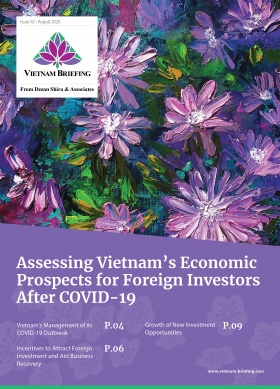Q&A: M&A Opportunities and Processes in Vietnam
Mergers and Acquisitions (M&A) provide a unique solution to several obstacles for foreign investors wanting to enter the Vietnam market.
With an M&A, investors can enjoy preexisting access to consumers, locations, and distribution channels. Local knowledge can thus prove critical to successful operations in Vietnam’s vibrant but rapidly changing investment environment.
To learn more about M&A opportunities in Vietnam, our International Business Advisory Manager, Dezan Shira & Associates, Ho Chi Minh City, Trent Davies discussed several opportunities in our recent webinar: M&A Opportunities and Processes in Vietnam. The webinar can be viewed here.
We highlight key insights below:
What does the M&A landscape in Vietnam look like?
M&As in Vietnam have been a popular route for investors with several deals taking place in the last few years. The sector is attractive to investors due to obvious advantages. To put this into perspective in 2018, there were at least 266 M&A deals in Vietnam with a value of US$7.5 billion. 56 percent of this was in the form of inbound investment. While there were some large deals such as investment in Vietnam’s Sabeco and Vinhomes, 70 percent of deals were with small to medium-sized businesses. Over time M&A has picked up with M&A value growing by 21 percent between 2008 to 2018.
Recent years have seen a decline in global M&A activity due to macroeconomic uncertainty, geopolitical instability, and the pandemic in 2020 affecting companies further. Nevertheless, the impact of COVID-19 and diversification of supply chains has made Southeast Asia attractive. With Vietnam containing the pandemic well, we are likely to see more M&A activity in 2021.
The Ministry of Planning and Investment (MPI) released statistics on capital contribution and share purchases between January-September 2019 and 2020. This indicator was down by 55.1 percent in 2020 showing how even how M&A activity in Vietnam was affected by the pandemic.
Nevertheless, Euromonitor International ranked Vietnam as the world’s second M&A attractive market with emerging economies likely to make a strong comeback after the pandemic.
What are popular industries in M&A and where do these investors come from?
Most of the M&A activity has come into manufacturing and processing followed by real estate activities, wholesale and retail trade, professional and technical activities, and construction. Leading investors have come from Singapore, Japan, and South Korea
What are some drivers of the increased inbound M&A activity in Vietnam?
There are several reasons for this: one is Vietnam’s demographics – it has one of the fastest-growing middle classes in the region with increasing urbanization. Consumer spending is growing with significant growth in e-commerce. Vietnam has several tax incentives and pro-FDI policies. Its government is stable and has continued to focus on high growth while improving the business climate. One of Vietnam’s biggest strengths is its free trade agreements. With the EVFTA recently signed, Vietnam is likely to further benefit from opening up its economy and growing trade.
Can you share some opportunities in the Vietnamese market?
Apart from Vietnam’s demographics, Vietnam has strong market fundamentals. Due to its control of the pandemic, Vietnam has been able to reopen its economy quicker than others. Thus, investors investing in Vietnam will gain a first-mover advantage compared to others. The pandemic has also resulted in several distressed businesses making it easier to acquire them. Another important opportunity is the relocation of manufacturers and supply chains from China. This is a continuing process and there remains further scope to develop supply chains and supporting industries in Vietnam. The government is also looking to divest state-owned enterprises. This process has been slow but is definitely ongoing.
And on the flip side, what are some challenges and barriers?
At present, border closures are a major obstacle for both buyers and sellers, however, this presents more opportunity for domestic deals. Identifying targets is another area that is quite challenging where clients don’t know where to start. There is also a lack of reliable publicly available information on target companies. Typically the target companies not legally required to disclose this information and therefore it’s important to take your time to do the necessary due diligence during an M&A. We’ve also seen gaps in valuation between the buyer and seller.
What’s the legal framework for M&As in Vietnam?
Vietnam doesn’t have a unified law on M&As, rather M&As are largely governed by the Law on Enterprise and the Law on Investment and to a lesser extent by the Law on Securities and the Law on Competition. The recently amended Law on Enterprises and Law on Investment will be in effect from January 1, 2021. These amended laws provide updates on conditional business lines, investment incentives while removing administrative approval for certain types of investment projects. Investors should study these laws carefully before embarking on an M&A.
Do you have a tried and tested M&A process in Vietnam?
Yes, we do. The key is to have a clear strategy from the beginning to understand the goals that you want to achieve and define core objectives. This will help the investor identify targets. As mentioned earlier, the target screening process can be challenging in Vietnam. The third phase I would like to focus is on due diligence.
Due diligence is important and needs to be comprehensive. Ideally, it is better to have a third party do the due diligence unless you have the expertise to do so. A thorough due diligence needs to take everything into account including legal, financial, tax, and HR issues as well as background and reputational checks. Vietnam’s labor laws protect employees and any oversight could be an expensive endeavor for the business. Following due diligence, we would move to the negotiation and transaction phase and finally end with an M&A integration.
This is a comprehensive process and does take time, but will benefit you in the long run. We do see that there is likely to be an uptick in M&A activity particularly in 2021, as a result of the pandemic.
About Us
Vietnam Briefing is produced by Dezan Shira & Associates. The firm assists foreign investors throughout Asia from offices across the world, including in Hanoi and Ho Chi Minh City. Readers may write to vietnam@dezshira.com for more support on doing business in Vietnam.
- Previous Article Vietnam bemüht sich um eine Reform der Geschäftsabläufe. Die Erleichterung der Geschäftstätigkeit: Dekret 122
- Next Article Q&A: M&A – Mergers & Acquisition Möglichkeiten und -Prozesse in Vietnam































